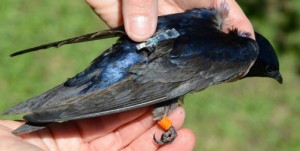Toronto, June 3, 2013 – A mismatch between the departure schedules of songbirds and higher spring temperatures at their breeding sites is putting them at risk, according to a new study out of York University.
The study, “A Trans-Hemispheric Migratory Songbird Does Not Advance Spring Schedules or Increase Migration Rate in Response to Record-Setting Temperatures at Breeding Sites”, published in the journal PLOS ONE, tracked the spring migration of purple martins over five years from the Amazon basin to two breeding sites in eastern North America. Researchers outfitted the birds with tiny geolocator “backpacks” to record data on their movements and found that the birds’ departure times between years were surprisingly consistent, despite variation in temperature at their final destination.
“We found that purple martins migrating between the Amazon Basin and North America did not adjust their migration timing even during the hottest spring on record in 2012,” says study author Kevin Fraser, a Postdoctoral Fellow in York’s Department of Biology, Faculty of Science. “This means that they arrived ‘late’ for the advanced spring, and likely missed out on peak food they need to be productive breeders.”
Aerial insectivores, like purple martins and other swallows, are experiencing strong population declines, particularly species migrating longer distances and populations breeding further north. Scientists have shown in a European species that declines may be due to an inability to advance arrival schedules to match a warming climate. This study provides the first direct evidence of a discrepancy between higher spring temperatures at breeding sites and departure schedules of individual songbirds.
“Our results suggest that long-distance migrants may receive limited or conflicting environmental cues about conditions at the breeding grounds while still at overwintering sites or along migration routes,” says Fraser. “Once en route, the birds received no temperature cues of the warm spring until they reached the US Gulf coast, at which point it was likely too late to get to breeding sites earlier.”
Fraser says such mistiming is an active area of new research, and with climate change may be an important contributing factor to migratory songbird declines.
“Some migratory songbirds may not have the flexibility they need to respond quickly to earlier springs and more variable weather with climate change, which could contribute to the strong population declines we see in many species. Identifying which species or populations may be at greatest risk will be very important for guiding effective conservation action.”
He says the study suggests that migration timing and rate in purple martin is not highly sensitive to short-term variation in temperature and rainfall, and that multiple years of increasing spring temperatures may be required to shift the birds to an earlier breeding arrival time through natural selection for earlier departure from tropical overwintering sites.
York University is helping to shape the global thinkers and thinking that will define tomorrow. York U’s unwavering commitment to excellence reflects a rich diversity of perspectives and a strong sense of social responsibility that sets us apart. A York U degree empowers graduates to thrive in the world and achieve their life goals through a rigorous academic foundation balanced by real-world experiential education. As a globally recognized research centre, York U is fully engaged in the critical discussions that lead to innovative solutions to the most pressing local and global social challenges. York U’s 11 faculties and 28 research centres are thinking bigger, broader and more globally, partnering with 288 leading universities worldwide. York U's community is strong − 55,000 students, 7,000 faculty and staff, and more than 250,000 alumni.
-30-
*Hi-res photos available upon request.
Media Contact:
Robin Heron, Media Relations, York University, 416 736 2100 x22097 / rheron@yorku.ca


